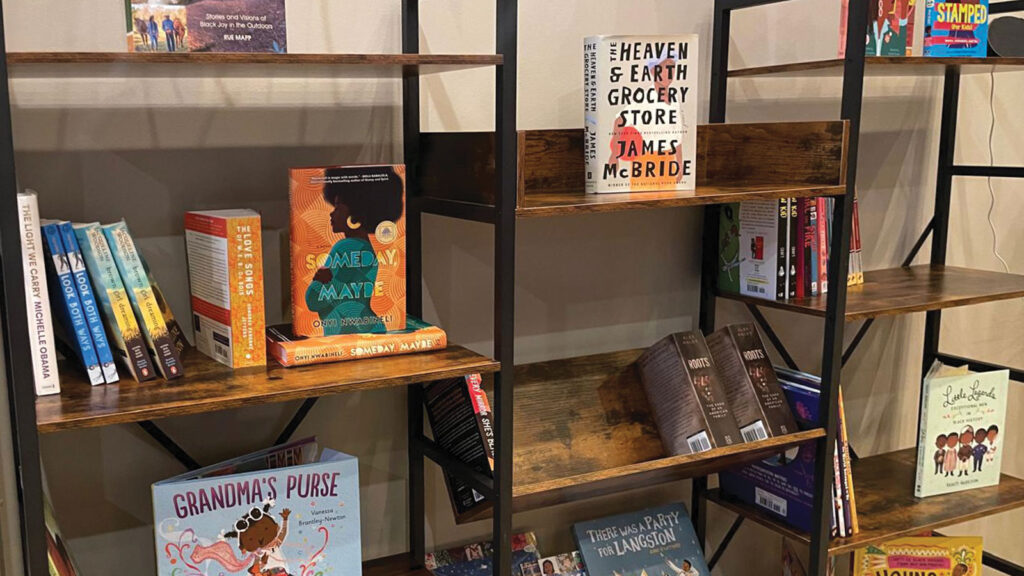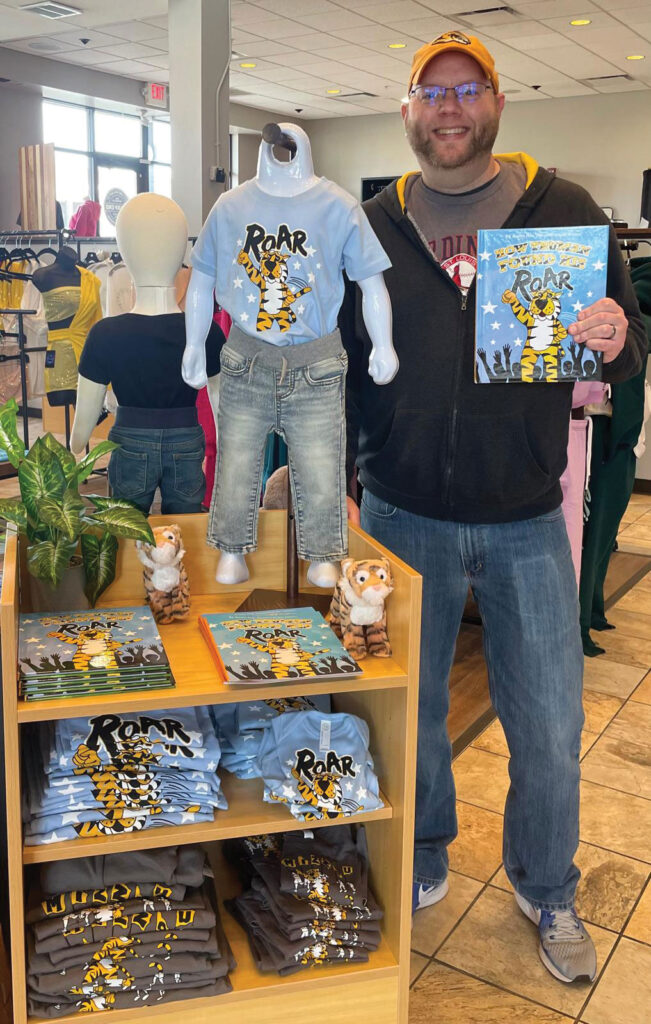REDI’s Button spells out how the business incubator started.
Starting from scratch can sometimes be challenging, and that certainly describes the efforts that went into creating The Shops at the Sharp End.
As a catalyst for business development, Columbia’s Regional Economic Development Inc. (REDI) reacted to the COVID pandemic by recognizing that the industries hardest hit were food-based and retail businesses. In response, REDI considered ways to boost those business sectors.
A partnership was developed among Central Missouri Community Action (CMCA), the Downtown Community Improvement District (The District), and REDI. The plan was to create a shared physical space while also offering programs including business coaching, training, and mentorship. Training would involve workshops for retail including how to manage inventory, navigating questions about leasing, and how to display the products
The space that would become The Shops at the Sharp End was originally used as a commercial kitchen for COMO Cooks. Caterers, bakers, and other cooks started there. COMO Cooks later moved to Business Loop and is now part of The Loop CID.
With the space empty, the decision was made to remodel it with the goal of housing retail entrepreneurs in a shared space where they could sell their items while also participating in workshops, training, and coaching.
The three partnering organizations meet every Friday. REDI provides support for operations such as overhead, utilities, leasing, equipment, coaching, and peer-to-peer mentoring. The District handles the marketing, promotion, and events that will be held at The Shops. CMCA, through the Missouri Women’s Business Center, provides a variety of support that includes business coaches. Coaching helps entrepreneurs learn what items sell and determine which products are most successful.
The Shops are designed to reduce the barriers for “low to moderate income individuals and minorities and give them a place to start new retail enterprises,” says Stacey Button, REDI president. The goal is to help startup entrepreneurs successfully grow into brick-and-mortar businesses — or e-commerce enterprises — with locations downtown and around the city.
The Shops at Sharp End were named to honor the area that was the city’s vibrant Black business district throughout most of the twentieth century, until Sharp End was dismantled and replaced via “urban renewal” in the late 1950s and early 1960s. The Shops encourage minority entrepreneurs to embrace that history as part of their participation
Button says the REDI, District, and CMCA partners work in the background to let The Shops stand out. As the businesses grow, job opportunities also increase and the local economy becomes more diverse, she says. And that will generate demand for more retail space. It increases job opportunities, diversifies our economy, and generate demand for more retail space.

Raw Roots Turmeric
Passion drives Ranjana Hans in creating and building her business, Raw Roots Turmeric.
She specializes in selling herbs using the knowledge she learned as part of her heritage and the ancient wisdom she gleaned while growing up in India. For instance, when someone fell ill, tht person was treated with various herbal remedies. After coming to the United States, Hans discovered that herbs were also used for remedies here.
Hans used that knowledge in treating family members, as well as passing it along to friends. But that was not enough. When asked a general question about what she did, Hans realized she took care of her family and home, but still felt something was missing. It dawned on her she should be sharing her knowledge of herbal treatments. She asked her children and her husband for their thoughts, and they were enthusiastically supportive.
Her husband, a University of Missouri research scientist studying inflammation, offered to work out the formulas for composition for the herbal creations she wanted — and a business was born. Hans incorporated education into her approach, and she holds seminars, teaches at community gardens, and makes presentations at conferences.
The name Raw Roots Turmeric was purposely chosen. The “raw” emphasizes getting the natural oils and all the nutrition out of the herb. “Roots” refers to the basic knowledge of how powerful and beneficial the herb can be. “Turmeric” is the most popular and primary product being used.
Hans started her business at the Columbia Farmers Market during the pandemic. She gave out sheets of information to help educate the public about the benefits of using turmeric. She experimented with the best ways to display her products while talking to potential customers. The goal was to build trust in the community.
The Missouri Women’s Business Center and REDI were mentors for every part of the business, Hans pointed out. She has received grants, including one from the Missouri Department of Agriculture so the herbs can be grown in a greenhouse. She said Missouri’s climate is not conducive for turmeric, which takes seven to nine months to grow.
Demand for her products has grown and Hans gets requests for information and ships everywhere. She has displayed at the Missouri State Fair, and the National Restaurant Association showcased her products.

Black Tea Bookstore
Dreams that become reality can be extra special. Since she was a little girl, Candace Hulsizer thought about opening a bookstore. She had never seen herself reflected in books.
Once she became an adult, she talked with those close to her about making her dream a reality. Her husband was supportive and offered to help get it started. The naming was a bit more of a challenge. Chatting with a friend from South Africa, the friend humorously suggested incorporating “tea” in the name since Hulsizer likes all kinds of tea.
Knowing what type of books and market she was going to target, the name Black Tea Bookshop was born.
The next step was a “proof of concept” to see if there was interest in books in her area. By using popups and attending small business expo events, she determined there was enough interest to merit launching a business.
Working with a business coach through the Women’s Business Center and being a member of The REDI Hub, Hulsizer worked on developing her business. She determined there was a need and that to be successful, she needed to build community. The focus would be on upbeat, uplifting books while including the issues that are important. Her goal highlighted on her website is “to showcase the value of stories written by Black authors who highlight Black traditions and culture.”
“I’m a reader so I know a lot of books,” she says. As she developed her business, Hulsizer got advice from booksellers, warehouses, and publishers about books to choose. Some would be based on books she personally liked. The Black experience is what she wants people to read about, particularly reflection, joy, and resilience. In addition, she offers an array of fiction and nonfiction books covering cooking, traveling, sci-fi, and thrillers.
Timing is everything and she learned of the plans for creating an entrepreneurial shop called The Shops at Sharp End not long after she started. She was not ready for a brick-and-mortar operation; the incubator model of The Shops seemed the best way to build toward that goal. She also depends on referrals, events, social media and her website.
Hulziser hopes to someday have her own shop where people will be able to sit and sip a tea, and preferably her own tea brand that is currently in development with a company in North Carolina.

Aaron Fox Writes
After earning a journalism degree at the University of Missouri, Aaron Fox pivoted and went to work at State Farm Insurance. Eventually, a friend asked him to join a radio show knowing he had done radio while in college.
During the radio show he had joined, Fox came up with the idea for a children’s book. While they were chatting on the air, he came up with the idea of a ninja sloth, and the character became a topic of conversation. Thus, a story was be born from a casual, off-beat conversation about sloth-like tendencies.
“It would be cool to create a story out of nowhere and get it published,” Fox says, recalling his epiphany. He researched the topic and faced several challenges as he learned new steps along the way, such as copyright requirements and getting an International Standard Book Number (ISBN).
He explained the process and feeling as “amazing endorphin with an idea you come up with all your own,” which results in “a story others can read. Pretty cool.”
He was offered a contract by the MU Health Care Children’s Hospital to write a book about TJ Mascot to explain the hospital’s move from Keene Street to a new campus next to University Hospital.
Fox had been interested in children’s books since working at Scholastic Books, which also happened to be when he was dating his future wife, a third-grade teacher. They purchased numerous books there in anticipation of having children.
Working with REDI and a business coach helped develop a valuable business plan, followed by the opportunity to place his books at the Shops at the Sharp End.
“I love the history. It’s a great way to get out in the community,” he says. Fox’s space there displays his books along with Ninja Sloth shirts which are flanked at the display by a sloth.
The next goal is to take his writing and publishing knowledge to help others. He envisions creating a network to help people with consulting, publishing, and monetizing their creative writing works. That could evolve into having a group of children’s book writers creating their books. Fox says that system could lead to him buying the books wholesale and then working to sell them.









